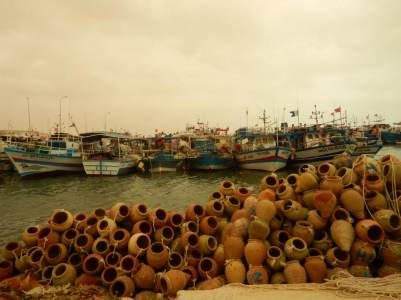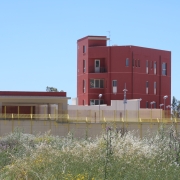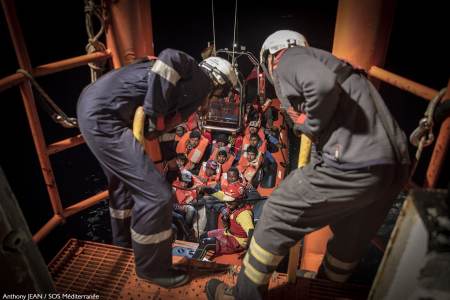Tunisia, Zarzis. Fishermen protest against the so-called Libyan Coast Guard
Article first published on September 14, 2021
Globalproject.info – For the past week, fishermen members of the Zarzis Le Pêcheur – Al Bahar association (of the coastal town of Zarzis in southeastern Tunisia, in the neighbouring governorate of Libya) have been blockading their fishing port and putting up an urgent call for help to the Tunisian authorities.
As explained in a statement, the small fishermen are calling for protection and rescue from the Tunisian authorities for what they describe as acts of piracy by the [so-called] Libyan Coast Guard in Tunisian territorial waters and in the Search and Rescue (SAR) zone.
Zarzis fishermen work in the international waters between Italy, Tunisia and Libya. They have been rescuing migrants leaving from Libya in overloaded and dilapidated boats at sea since before the 2011 revolutions. The kidnapping of Tunisian (and other) fishermen by various Libyan armed groups, often for ransom, is not a new phenomenon. Recently, however, such kidnappings with firearms, hijacking of boats and ransom demands have increased.
Since this summer, the [so-called] Libyan Coast Guard – particularly the one in Zawiya, according to fishermen from Zarzis – has been operating in the SAR area and in Tunisian territorial waters intercepting and returning migrants to Libya, as established in the agreements with Italy and the European Union. Libyan Coast Guard boats were also spotted in other Tunisian locations further north, near the city of Mahdia.
As a result of these attacks, fishermen are increasingly hesitant to divulge their location to report boats in trouble for fear of also being kidnapped when the so-called Libyan Coast Guard arrives. Fishermen are asking for help from NGOs in bringing rescue to the Mediterranean and protection from the Tunisian state. We publish below the statement of the Association Zarzis Le Pêcheur – Al Bahar, translated by Issameddinn Gammoudi and Valentina Zagaria.
Zarzis fishermen: The fishing sector is dying because of an unfair international agreement and the absence of a national policy
Zarzis fishermen are constantly suffering not only because of inadequate port infrastructure, poor assistance, the repercussions of the political situation in neighbouring countries, environmental degradation and its impact on marine life, but also because of recent piracy operations and armed threats to Tunisian fishermen within Tunisian territorial waters committed by armed men claiming to be members of the [so-called] Libyan Coast Guard. These practices have become frequent, including the kidnapping of people, the illegal seizure of boats and the negotiation of ransoms.
As an association that defends the legitimate and common professional interests of fishermen, we appeal to the authorities, led by the Presidency of the Republic, to intervene urgently and resolve this crisis that not only threatens the continuity of fishing but has also turned into a violation of national sovereignty:
– We hold the Ministry of Agriculture, the Ministry of Foreign Affairs, the Ministry of Defence and the Presidency of the Government responsible for the catastrophic situation produced by the agreement signed between the European Union, Malta, Tunisia and Libya. We also consider this agreement to be a violation of the national sovereignty of the Tunisian state over its maritime territory, which has imposed unfair restrictions on Tunisian fishermen, unlike their counterparts in neighbouring countries.
– We call on the Tunisian Navy and the Tunisian National Maritime Guard to play their role in protecting Tunisian fishing vessels that have been attacked also within Tunisian territorial waters by groups claiming to belong to the [so-called] Libyan Coast Guard.
– We hold the state structures in charge of controlling indiscriminate and banned fishing responsible for the low profitability and we demand respect for the right to a dignified life of Tunisian fishermen in the southeast of the country.
– We call for urgent action by all the authorities concerned to protect Tunisian boats and Tunisian sailors in Tunisian maritime territory, a protection that should be the most basic component of the state’s authority over its territory.
The global crisis and its repercussions add to all these circumstances, which have contributed to the deterioration of fishing activity in the region and oblige us to put out a call for help to try to preserve the sustainability of the sector in Zarzis and throughout the south-east of the country.
Association Zarzis Le Pêcheur – Al Bahar per lo Sviluppo e l’Ambiente
Slaheddine Mcharek, Presidente
Translated by Francesca Cavallo
Proofread by Matthew Campbell







